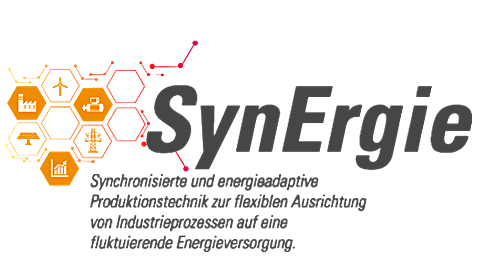Synchronized and energy-adaptive production technology for the flexible alignment of industrial processes to a fluctuating energy supply
| Funding | Federal Ministry of Education and Research (BMBF) |
| Duration | September 2016 till August 2017 |
| Contact | Clara Orthofer M.sc. |
| Website | Industrial processes: Kopernikus project SynErgie |
| Final Report | Flexibility options and prospects in the primary industry |

Due to the ever-increasing proportion of fluctuating electricity producers, an efficient balance between energy supply and demand is required. In future, a balanced technology mix between renewable energies, flexible conventional power plants, storage facilities, grid expansion and flexible users will be necessary to guarantee security of supply. Many of these solution components are associated with high costs, which are passed on to the user, and entail social acceptance problems. With a total of 44 % of net electricity demand and 25 % of heat demand in Germany, industrial processes and in particular large individual plants in energy-intensive industrial sectors have considerable leverage for flexibility. The medium and short-term flexibilization of electricity demand, known as demand-side management (DSM), offers an opportunity to enable the restructuring of the energy system in a cost-efficient and socially acceptable manner.
SynErgie supports the cost-efficient implementation of the energy transition based on renewable energies and thus enables Germany to become the leading international provider of flexible industrial processes. The research work will initially start with seven energy-intensive sectors: steel and aluminum production, the chemical industry, mechanical and plant engineering, the paper, food, cement and automotive industries. These account for around 90 % of net industrial electricity demand. The SynErgie project is looking at the energy-intensive key production processes in these sectors in order to synchronize their energy requirements with the fluctuating supply of renewable energy. To this end, the conventional, monolithic automation structures are to be broken up and technologically adapted. A highly dynamic control platform will be created with the help of modern information and communication technology (ICT) approaches. It regulates the energy distribution between the industrial processes and takes into account the fluctuating energy supply. In addition to the technical and economic aspects, the project integrates legal and societal perspectives into its solutions. In preparation for an efficient implementation of the research results, the developed approaches will be demonstrated as models in the "Energy-Flexible Region Augsburg" and subsequently evaluated from a technical and socio-economic perspective.
SynErgie is an interdisciplinary consortium with broad participation from energy-intensive industry. Under the leadership of TU Darmstadt and the University of Stuttgart, the Chair of Energy Economics and Application Technology is working together with more than 80 cooperation partners from science, industry and civil society to integrate energy-intensive industrial processes into the future energy system. The application partners from industry are working together with leading research institutes from the fields of production and process engineering, energy management, (business) informatics and social, legal and economic sciences to develop holistic, synergetic solutions. A large number of companies and civil society organizations in the region are involved in implementing the developed concepts for industrial demand flexibilization in the "Energieflexible Region Augsburg" in order to guarantee the economic efficiency and social balance of the solutions developed.